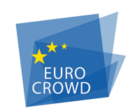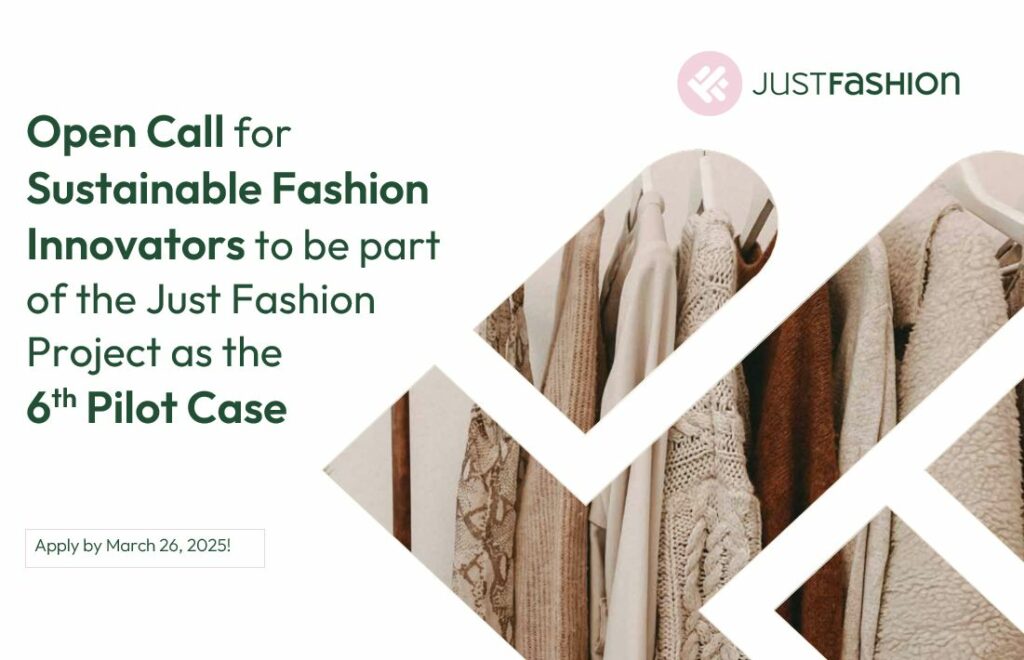Some 20 European partners have launched a major initiative, Just Fashion, coordinated by the University of Antwerp, aiming to transform the fashion sector into a more sustainable, circular, and socially inclusive industry. We are excited to announce that EUROCROWD is part of this effort, a pioneering initiative dedicated to accelerating sustainability in the fashion industry. As part of this joined venture, we are contributing to the transformation of SMEs in the sector, helping them transition towards circular, low-carbon, and socially inclusive business models and funding strategies.
Just Fashion, funded by Horizon Europe of the European Union, has now launched its final open call, offering an opportunity for forward-thinking fashion businesses to join as the 6th pilot case. This is a unique chance to test and implement innovative technologies and business models that drive the green transition in fashion.
Why Apply?
- Experiment with sustainable innovations in production, recycling, traceability, and circular business models.
- Collaborate with an EU-wide network of industry leaders and sustainability experts.
- Contribute to policy recommendations and the development of AI-based tools supporting MSMEs.
- Access up to €100,000 in funding (with a 30% self-financed contribution).
Application Details
📅 Deadline: March 26, 2025 (17:00 CET)
📍 Duration: June 2025 – November 2027
The Existing Pilot Cases
The selected business will join five leading sustainable fashion innovators from across Europe:
- Xandres (Belgium) – Implementing Digital Product Passports and resale models for increased transparency.
- Luisa Cerano (Germany) – Transforming sourcing & production processes to drive eco-design.
- Boboli (Spain) – Testing second-hand sales, leasing models, and post-consumer recycled textiles.
- Bastet Noir (North Macedonia) – Scaling a made-to-measure model to reduce waste and empower women.
- Staff Jersey (Italy) – Enhancing transparency and adopting digital solutions for sustainable production.
How to Apply
If you’re a fashion business looking to pioneer sustainability, apply now to be part of this game-changing initiative!
Find the full details and application form here: https://lnkd.in/dBCVV2VP
Tackling Fashion’s Environmental Footprint
The European fashion industry is a significant economic force, with more than 160,000 companies employing 1.5 million people. However, its environmental impact is equally substantial. Textile consumption in the EU ranks among the top contributors to pollution, with 5.8 million tonnes of textiles discarded annually and high carbon emissions resulting from overproduction and wasteful consumption patterns.
To address these challenges, the Just Fashion project—a Horizon Europe-funded initiative coordinated by the University of Antwerp—has been launched. This ambitious collaboration between 20 partners from eight European countries (Belgium, UK, Lithuania, Italy, Spain, Germany, North Macedonia, and Portugal) aims to support Micro, Small, and Medium Enterprises (MSMEs) and SMEs in navigating the transition toward a greener and more transparent fashion industry.
“The fashion industry is at a critical turning point. Just Fashion will provide companies with the necessary tools and guidance to implement circular and socially responsible business models, aligning with new European Green Deal regulations,” says Professor Annick Schramme, project coordinator and expert in fashion management at the University of Antwerp.
A Roadmap for Sustainability
Just Fashion’s key objectives include:
· Mapping sustainability in the European fashion sector to gain insights into existing challenges and best practices.
· Developing and testing circular business models that support companies in reducing their carbon footprint and waste.
· Implementing six pilot projects focusing on diverse aspects of circularity, such as material innovation, zero-waste prototyping, recycling, and transparency in supply chains.
· Enhancing digital tools and AI-based solutions to assist fashion businesses in complying with the European Green Deal and future policy regulations.
Building a Circular and Inclusive Fashion Industry
The European Commission has set ambitious sustainability goals, including the EU Strategy for Sustainable and Circular Textiles (2022), which demands a shift to longer-lasting, recyclable, and ethically produced fashion items. To meet these objectives, Just Fashion will update existing tools and instruments, create AI-driven policy support mechanisms, and provide hands-on assistance for MSMEs and SMEs.
“Many fashion companies want to adopt more sustainable practices but often don’t know where to start. Just Fashion will bridge this gap by equipping them with practical solutions that enhance circularity and social responsibility,” explains Schramme.
A Multi-Stakeholder Approach
The Just Fashion consortium consists of leading universities, research institutes, industry organizations, and business networks, including:
- Universities & Research Institutes: University of Antwerp (Belgium), Vilnius Gediminas Technical University (Lithuania), University for the Creative Arts (UK), Eurecat (Spain).
- Industry & Business Support Organizations: MODACC (Spain), Fashion Council Germany, European Fashion Alliance (Germany), Flanders DC (Belgium), ADRAL (Portugal), Materahub (Italy).
- Development & Policy Agencies: EURADA (Belgium), ART-ER (Italy), European Crowdfunding Network (Belgium).
- Fashion Companies & SMEs: Luisa Cerano (Germany), Staff Jersey (Italy), Boboli SA (Spain), Bastet Noir (North Macedonia), Xandres (Belgium), Waanzin (Belgium).
We look forward to seeing innovative and forward-thinking fashion businesses take part in shaping a more sustainable future for the industry!
Disclaimer: Just Fashion is Funded by the European Union. Views and opinions expressed are however those of the author(s) only and do not necessarily reflect those of the Research Executive Agency. Neither the European Union nor the granting authority can be held responsible for them.



